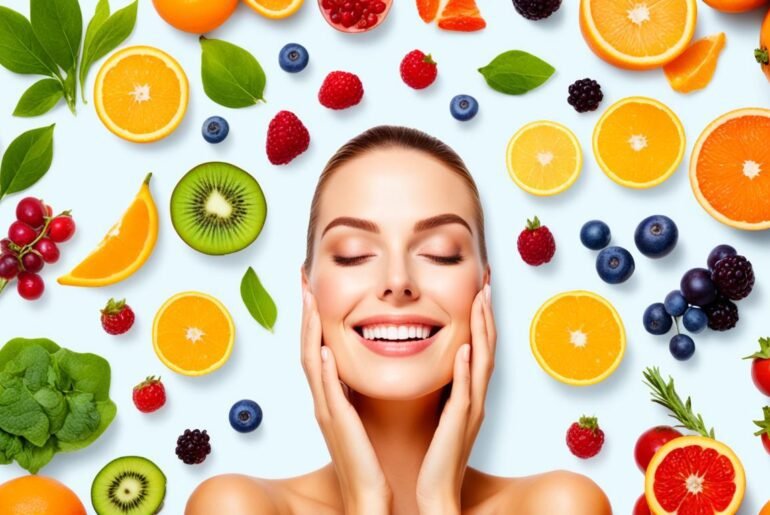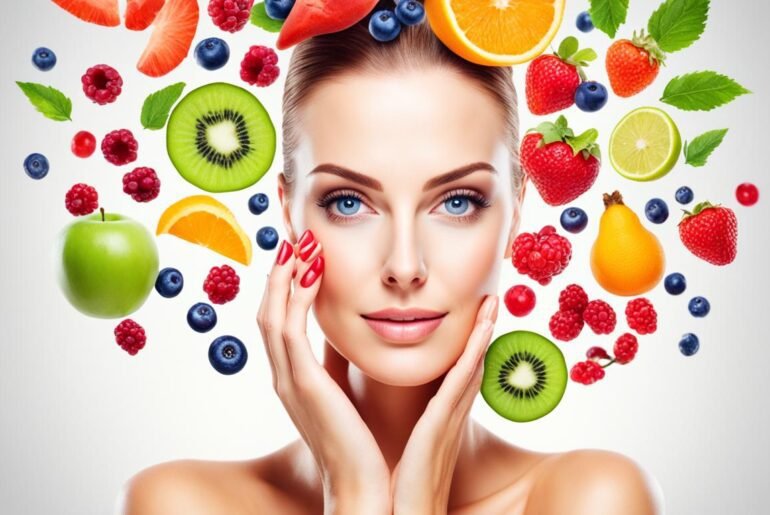Did you know that the skin is constantly exposed to harmful environmental factors that accelerate aging and cell damage? Fortunately, nature has provided us with a powerful defense mechanism in the form of antioxidants. Antioxidants have the ability to protect the skin from free radicals and oxidative stress, helping to maintain its youthfulness and health.
In this article, we will explore the incredible benefits of antioxidants for the skin and highlight some of the best natural sources of these skin-saving compounds. From antioxidant-rich foods to skincare products, you’ll discover how to incorporate antioxidants into your daily routine to achieve radiant and healthy skin.
Key Takeaways:
- Antioxidants are essential for preventing aging and cell damage in the skin.
- Vitamins A, C, and E, selenium, zinc, carotenoids, flavonoids, and glutathione are some of the powerful antioxidants that benefit the skin.
- Antioxidants in skincare products can have anti-aging and skin-improving properties, but their effectiveness varies.
- Antioxidant-rich foods like tomatoes, blueberries, spinach, and dark chocolate can enhance skin health.
- While antioxidant supplements are available, it’s important to consult a healthcare professional before starting any.
Antioxidants in Skincare Products
Skincare products are a popular choice for incorporating antioxidants into your daily routine. Many of these products contain natural skincare ingredients with antioxidants that offer anti-aging and skin-improving properties. Some common antioxidants found in skincare products include retinoids, vitamin C, and vitamin E.
Vitamin C is particularly beneficial for the skin as it is the most abundant antioxidant naturally found in human skin. It plays a crucial role in protecting against sun damage and replenishing vitamin E levels. When applied topically, vitamin C can provide a range of benefits, including reducing the appearance of fine lines and wrinkles, brightening the complexion, and promoting collagen production.
Retinoids, another popular antioxidant, are often used in skincare products to address mild acne or fine lines. They work by speeding up cell turnover and stimulating the production of collagen. However, it’s important to use retinoid products with caution and follow the instructions provided, as they can sometimes cause skin irritation and sensitivity. It’s also crucial to apply sunscreen when using retinoid products, as they can increase the skin’s sensitivity to the sun.
The effectiveness of antioxidant skincare products can vary, so it’s important to choose products that are suitable for your skin type. The American Academy of Dermatology recommends identifying your skin type before using skincare products and avoiding products that can potentially irritate your skin.
“Choosing antioxidant skincare products that are specifically formulated for your skin type can help ensure that you’re maximizing the benefits of antioxidants for your skin.”
Incorporating antioxidants into your skincare routine can be a valuable addition to your overall skincare regimen. By using products that contain antioxidants like retinoids, vitamin C, or vitamin E, you can provide your skin with the nourishment it needs to combat free radicals and promote a healthy complexion. Remember to choose products that suit your skin type and always follow the recommended usage instructions.
| Skincare Ingredient | Antioxidant Benefits |
|---|---|
| Retinoids | – Supporting collagen production – Minimizing fine lines and wrinkles – Promoting cell turnover |
| Vitamin C | – Brightening the complexion – Protecting against sun damage – Stimulating collagen synthesis |
| Vitamin E | – Moisturizing and hydrating the skin – Providing antioxidant protection – Soothing irritation and inflammation |
Remember, incorporating antioxidants into your skincare routine is just one aspect of maintaining healthy and radiant skin. It’s also crucial to practice proper sun protection and adopt a holistic approach to skincare that includes a balanced diet, regular exercise, and adequate sleep. By taking a comprehensive approach to skincare, you can maximize the benefits of antioxidants and achieve the healthy and glowing skin you desire.
Antioxidants in Food

When it comes to achieving glowing skin, incorporating antioxidant-rich foods into your diet is essential. These foods are packed with vitamins, minerals, and other beneficial compounds that can support skin health and radiance. Some of the best antioxidant-rich fruits and vegetables that promote a healthy complexion include:
“Let food be thy medicine and medicine be thy food.” – Hippocrates
| Fruits | Vegetables |
|---|---|
| Tomatoes | Spinach |
| Blueberries | Garlic |
| Watermelon | Carrots |
These antioxidant-rich foods are powerhouses of vitamins A, C, and E, as well as other antioxidants like carotenoids and polyphenols. They help fight oxidative stress in the skin, reducing signs of aging, improving skin glow, and even preventing sunburn.
Additionally, incorporating other antioxidant-rich ingredients into your meals can further enhance the benefits for your skin. Consider adding herbs like turmeric, oregano, or ginger, as well as spices like cinnamon and cumin to your dishes for an extra antioxidant boost.
By nourishing your body with antioxidant-rich foods, you can nourish your skin from within, resulting in clear, glowing, and healthy skin.
Antioxidant Supplements for Skin Health
While getting antioxidants from food is the most natural and recommended way, some people may choose to take antioxidant supplements. Supplements containing vitamins A, C, and E, as well as other antioxidant minerals like selenium, zinc, and copper, are available. However, it is important to consult with a healthcare professional before starting any supplements, as they may interact with medications. Additionally, it is crucial to note that supplements should not replace a healthy diet, but rather complement it.
Benefits of Antioxidant Supplements
Antioxidant supplements can provide an additional boost to your skin health by delivering concentrated amounts of essential vitamins and minerals. These supplements can:
- Support collagen production and promote skin elasticity
- Protect against oxidative stress and free radicals
- Enhance skin hydration and reduce dryness
- Improve overall skin tone and texture
- Minimize the appearance of wrinkles and fine lines
- Reduce inflammation and promote healing
By incorporating antioxidant supplements into your skincare regimen, you can help fortify your skin’s defense mechanisms and promote a healthier, more youthful complexion.
Choosing the Best Antioxidant Supplements
When selecting antioxidant supplements for skin health, it is essential to choose products from reputable brands that meet strict quality standards. Look for supplements that contain a combination of key antioxidants, such as:
- Vitamin A (retinol or beta-carotene): Helps promote cell turnover and improve skin texture.
- Vitamin C: Boosts collagen synthesis and protects against UV damage.
- Vitamin E: Shields the skin from free radicals and reduces inflammation.
- Selenium: Supports antioxidant activity and skin health.
- Zinc: Helps regulate oil production and promotes skin healing.
- Copper: Fosters collagen production and aids in skin rejuvenation.
Remember to carefully read the product labels and follow the recommended dosage instructions. It is always best to consult with a healthcare professional or dermatologist before incorporating any new supplements into your routine, especially if you have any underlying medical conditions or are taking medications.
| Supplement | Key Ingredients | Benefits | Price |
|---|---|---|---|
| Brand A Antioxidant Complex | Vitamins A, C, E | Boosts collagen production, protects against free radicals, improves skin texture | $XX.XX |
| Brand B Skin Defense Formula | Vitamin C, Zinc, Copper | Supports collagen synthesis, promotes healing, rejuvenates the skin | $XX.XX |
| Brand C Antioxidant Blend | Vitamins A, E, Selenium | Reduces oxidative stress, improves skin tone, protects against UV damage | $XX.XX |
Table: Comparison of Popular Antioxidant Supplements for Skin Health
Prices and benefits listed are for illustrative purposes only and may vary. It is advisable to research and compare different products to find the best antioxidant supplement that suits your individual needs and preferences.
Incorporating Antioxidants in Your Skincare Routine

In addition to using skincare products with antioxidants, there are various ways to incorporate antioxidants into your skincare routine. This can be achieved through the use of DIY skincare recipes that feature antioxidant-rich ingredients such as tomatoes, almonds, green tea, or cocoa. These natural ingredients can be applied directly to the skin, providing antioxidant benefits that promote skin health and radiance.
Did you know?
Tomatoes contain lycopene, a powerful antioxidant that helps protect the skin from damage caused by free radicals and UV radiation.
Another effective method of incorporating antioxidants into your skincare routine is by consuming green tea. Apart from its internal health benefits, green tea can also be used as an eye compress to provide antioxidant benefits to the delicate skin around the eyes. Simply brew green tea, allow it to cool, and then place the cooled tea bags on your closed eyelids for a refreshing and antioxidant-packed DIY eye treatment.
By mindful inclusion of antioxidants in your skincare routine, you can enhance the overall health and appearance of your skin, enjoying the benefits of their rejuvenating properties.
The Importance of Sun Protection
While antioxidants offer numerous benefits for skin health, they should not be viewed as a replacement for proper sun protection measures. Shielding your skin from harmful UV radiation is crucial in preventing sun damage and reducing the risk of skin cancer. Incorporating antioxidants into your skincare routine can complement sun protection efforts and provide additional defense against the damaging effects of the sun. However, it is important to understand that antioxidants alone cannot provide full protection and should be used in conjunction with other protective measures.
When it comes to sun protection, wearing sunscreen daily is essential. Choose a broad-spectrum sunscreen with a Sun Protection Factor (SPF) of 30 or higher to effectively block both UVA and UVB rays. Apply sunscreen generously to all exposed areas of your skin, including the face, neck, and hands. Reapply every two hours, or more frequently if you are sweating or swimming.
In addition to sunscreen, seek shade during peak sun hours, typically between 10 am and 4 pm. This will help reduce your exposure to intense UV rays and minimize the risk of sunburn and sun damage. When spending time outdoors, consider wearing protective clothing such as wide-brimmed hats, long-sleeved shirts, and sunglasses with UV protection. These clothing items offer an extra layer of defense by physically blocking the sun’s rays.
While antioxidants can enhance your skin’s natural defense mechanisms and provide some level of protection against UV radiation, they should not be solely relied upon as a substitute for proper sun protection measures. The combination of antioxidants and sun protection measures will provide more comprehensive protection for your skin.
To optimize your sun protection routine and incorporate antioxidants effectively, it is recommended to consult a dermatologist. They can provide personalized advice based on your skin type, concerns, and lifestyle. A dermatologist will guide you in choosing the right antioxidants for your skincare routine and help you create a holistic approach to maintaining healthy and radiant skin.
Research and Recommendations

Research on antioxidants and their effects on the skin is ongoing. While some studies have shown promising results in terms of antioxidant benefits for the skin, more research is needed to fully understand their mechanisms of action and long-term effects.
The American Academy of Dermatology recommends a healthy and varied diet as the most cost-effective way to improve skin health. Antioxidants can be obtained through a variety of natural sources, including fruits, vegetables, herbs, and spices. Consuming antioxidant-rich foods can provide a wide range of benefits for the skin, such as reducing signs of aging, improving skin glow, and protecting against sunburn.
When it comes to skincare products, it is important to be cautious and choose products suitable for your skin type. Not all antioxidants are created equal, and the effectiveness of antioxidant skincare products can vary. However, certain antioxidants, such as retinoids, vitamin C, and vitamin E, have been well-studied and are known for their benefits in improving skin health and appearance.
“A healthy and varied diet is the most cost-effective way to improve skin health.”
If you have specific concerns about your skin health or are considering incorporating antioxidant supplements into your routine, it is best to consult with a dermatologist. They can provide personalized advice and recommendations based on your individual needs.
| Antioxidant | Source | Benefits for Skin |
|---|---|---|
| Vitamin C | Citrus fruits, berries, kiwi | Boosts collagen production, brightens skin tone, protects against sun damage |
| Vitamin E | Nuts, seeds, spinach, kale | Moisturizes and nourishes the skin, protects against free radicals |
| Retinoids | Retinol, retinyl palmitate | Reduces wrinkles, improves skin texture, reduces acne |
| Green tea | Green tea leaves, matcha | Calms inflammation, protects against UV damage, improves skin elasticity |
While incorporating antioxidants into your skincare routine and diet can have noticeable benefits for your skin, it is important to remember that they should not replace proper sun protection measures. Sunscreen with SPF 30 or higher should always be applied, and protective clothing should be worn when spending time outdoors.
Tips for Healthy and Radiant Skin

In addition to incorporating antioxidants into your skincare routine and diet, there are other tips for achieving healthy and radiant skin.
- Get enough sleep: A good night’s sleep allows your skin to repair and rejuvenate itself. Aim for 7-9 hours of quality sleep each night.
- Manage stress: Chronic stress can lead to skin problems, such as acne breakouts and dullness. Find healthy ways to manage stress, such as through exercise, meditation, or spending time with loved ones.
- Exercise regularly: Physical activity increases blood flow, delivering oxygen and nutrients to your skin cells. Aim for at least 30 minutes of moderate exercise most days of the week.
- Avoid smoking: Smoking damages collagen and elastin, leading to premature aging and dull skin. Quitting smoking can improve your skin’s appearance and overall health.
- Limit alcohol consumption: Excessive alcohol consumption can dehydrate your skin and contribute to inflammation. Drink alcohol in moderation and be sure to hydrate with water.
- Stay hydrated: Drinking plenty of water helps keep your skin hydrated and plump. Aim for at least 8 glasses of water per day.
- Maintain a balanced diet: Eat a variety of fruits, vegetables, whole grains, lean proteins, and healthy fats to provide your skin with essential nutrients. Antioxidant-rich foods, such as berries, leafy greens, and nuts, can support skin health.
Taking a holistic approach to skincare and overall health can maximize the benefits of antioxidants for your skin.
Quote:
“Taking care of your skin is an investment that lasts a lifetime. By adopting healthy habits and incorporating antioxidants into your skincare routine, you can achieve a natural, healthy glow that radiates from within.”
Remember, consistency is key when it comes to skincare. Establish a daily routine that includes cleansing, moisturizing, and protecting your skin from the sun. By following these tips and incorporating antioxidants into your skincare and lifestyle, you can achieve and maintain healthy and radiant skin for years to come.
Conclusion
Natural sources of antioxidants, such as antioxidant-rich foods and skincare products, play a vital role in promoting overall skin health and enhancing its appearance. By incorporating antioxidants into your skincare routine and diet, you can benefit from their ability to protect against UV damage, reduce signs of aging, boost hydration and collagen production, and support the healing process.
However, it is essential to remember that antioxidants should not replace proper sun protection measures. Always complement your antioxidant usage with regular application of sunscreen with a high SPF, seeking shade, and wearing protective clothing when exposed to the sun.
Before starting any new supplements or skincare products, it is advisable to consult with a healthcare professional or dermatologist to ensure they are suitable for your specific needs and skin type. They can provide personalized recommendations and guidance based on your individual circumstances.
By prioritizing a healthy and balanced lifestyle, including a varied diet rich in antioxidant-rich foods, and following a holistic approach to skincare, you can maximize the benefits of antioxidants and achieve healthy, radiant skin.
FAQ
What are antioxidants and what benefits do they have for the skin?
Antioxidants are substances that can prevent or slow down aging and cell damage in the skin. They have numerous benefits for the skin, including reducing DNA damage from UV light, improving hydration, stimulating collagen and elastin production, reducing wrinkles and pigmentation, supporting healing processes, and reducing inflammation. Antioxidants can also play a role in preventing skin conditions such as vitiligo, atopic dermatitis, and acne.
How can I incorporate antioxidants into my skincare routine?
You can incorporate antioxidants into your skincare routine by using skincare products that contain antioxidants, such as retinoids, vitamin C, or vitamin E. You can also use DIY skincare recipes with antioxidant-rich ingredients or use green tea as a compress. It’s important to choose products suitable for your skin type and to consult with a dermatologist for personalized advice.
What are some antioxidant-rich foods for skin?
Some antioxidant-rich foods for skin include tomatoes, blueberries, spinach, garlic, green tea, watermelon, and dark chocolate. These foods are rich in vitamins A, C, and E, as well as other antioxidants like carotenoids and polyphenols. Incorporating these foods into your diet can contribute to clear, glowing, and healthy skin.
Are there antioxidant supplements for skin health?
Yes, there are antioxidant supplements available that contain vitamins A, C, and E, as well as other antioxidant minerals like selenium, zinc, and copper. However, it’s important to consult with a healthcare professional before starting any supplements, as they may interact with medications. Supplements should not replace a healthy diet, but rather complement it.
Why is sun protection important when using antioxidants?
While antioxidants can provide some protection against UV radiation, they should not replace proper sun protection measures. Wearing sunscreen daily with SPF 30 or higher, seeking shade, and wearing protective clothing are essential for preventing sun damage and skin cancer. Antioxidants can complement sun protection measures and provide additional protection, but they should not be solely relied upon.
What does research say about antioxidants and their effects on the skin?
Research on antioxidants and their effects on the skin is ongoing. While some studies have shown promising results in terms of antioxidant benefits for the skin, more research is needed to fully understand their mechanisms of action and long-term effects. The American Academy of Dermatology recommends a healthy and varied diet as the most cost-effective way to improve skin health.
What other tips can help achieve healthy and radiant skin?
In addition to incorporating antioxidants into your skincare routine and diet, other tips for achieving healthy and radiant skin include getting enough sleep, managing stress, exercising regularly, and avoiding smoking and excessive alcohol consumption. Staying hydrated by drinking plenty of water and maintaining a balanced and nutritious diet are also important.
How can antioxidants improve skin complexion?
Antioxidants can improve skin complexion by reducing signs of aging, improving hydration, stimulating collagen and elastin production, reducing wrinkles and pigmentation, and supporting the healing process. They can also reduce inflammation and prevent skin conditions such as vitiligo, atopic dermatitis, and acne.
What is the conclusion on natural sources of antioxidants for skin?
Natural sources of antioxidants for skin, including antioxidant-rich foods and skincare products, offer numerous benefits for overall skin health and appearance. Incorporating antioxidants into your skincare routine and diet can help protect against UV damage, reduce signs of aging, improve hydration and collagen production, and support the healing process. However, it is important to complement antioxidant usage with proper sun protection measures and to consult with a healthcare professional or dermatologist before starting any supplements or new skincare products.




